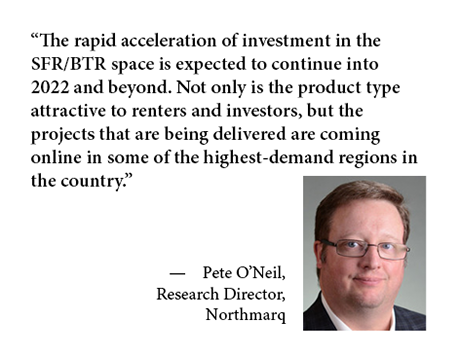CONROE, TEXAS — Chicago-based financial advisory firm Tempo Capital Group has arranged a $42 million nonrecourse construction loan for a 287-unit single-family rental project in Conroe, about 35 miles north of Houston. The project will be situated on a 45-acre site and will feature cottages, duplexes and two-story homes. Amenities will include a pool, fitness center and clubhouse. The direct lender and borrower were not disclosed. A construction timeline was also not released. Michael Berke led the debt placement for Tempo Capital Group.
Single-Family Rental
Build-to-RentConference CoverageDevelopmentFeaturesMultifamilyNorth CarolinaSingle-Family RentalSouth CarolinaSoutheastSoutheast Feature Archive
Speed to Market is ‘Almost the Only Priority’ for Multifamily Developers Looking to Avoid Cost Risks, Say InterFace Panelists
by John Nelson
CHARLOTTE, N.C. — Multifamily developers are pushing their chips in and aggressively looking for new development deals, especially for sites in and around high-growth markets in the Southeast. Michael Tubridy, senior managing director of Crescent Communities, said his firm isn’t leaving anything to chance and is looking to move quickly on development opportunities. “We’re trying to get as many units on the ground today as possible, because tomorrow will be more expensive,” said Tubridy. “I like the chances of today’s cost environment a lot better than I like the unknown of where we’ll be a year from now or two years from now. Putting a premium on speed to market is something that we are much more focused on; it’s almost the only priority right now.” Tubridy’s comments came during the development panel at InterFace Carolinas Multifamily 2022. The half-day event was held on April 14 at the Hilton Uptown Charlotte hotel and attracted more than 260 attendees from all facets of the multifamily industry in North Carolina and South Carolina. Michael Saclarides, director of Cushman & Wakefield’s Multifamily Advisory Group, moderated the discussion. Crescent Communities is far from the only multifamily developer pursuing ground-up construction opportunities in earnest. In …
MCKINNEY, TEXAS — Metro Philadelphia-based investment firm Morgan Properties has purchased parcHaus at Skyline, a 136-unit single-family rental community located on the northern outskirts of Dallas in McKinney. The newly built community features one-, two- and three-bedroom homes with garages and private backyards. The amenity package comprises a pickleball court, pool, dog park and a business center. Dallas-based Provident Realty Advisors sold the property for an undisclosed price. Morgan Properties has rebranded the community as Elevate at Skyline.
If there were any doubt that student housing stakeholders were quickly moving into the single-family build-to-rent market, the question was just settled for good. Chicago-based Harrison Street, one of the industry’s biggest players, recently announced a blockbuster deal to form a joint-venture with Core Spaces, one of student housing’s biggest developers. But this venture isn’t about student housing; it will invest up to $1.5 billion in subdivisions with hundreds of rental homes in markets such as Austin, Denver, Dallas, Orlando and Nashville. “We had an ah-ha moment,” says Justin Gronlie, managing director and Head of Education Real Estate at Harrison Street. He explains that Harrison Street was among the first firms to invest cottage-style student housing back in 2007, and since then, has developed and acquired more than 27 BTR-style student housing communities comprising 19,000 beds. The off-campus single-family style homes in highly amenitized developments are similar to the product in build-to-rent communities. “Due to our unique experience and track record in student housing, we recognized the patterns and magnitude of the BTR opportunity in front of us and pounced at it,” says Gronlie. Like student cottage projects, build-to-rent (BTR) or build-for-rent (BFR) developments offer detached units, townhomes or …
RICHMOND, TEXAS — Houston-based REIT Camden Property Trust has acquired 16 acres in the southwestern Houston suburb of Richmond for the development of a single-family rental community that will total 180 to 200 residences. The site is located within the 58-acre Grand Center at Long Meadow Farm mixed-use development. Ashley Strickland of NewQuest Properties represented the seller, CJ Development, in the sale of the land. Kenneth Danna of Dosch Marshall Real Estate represented Camden Property Trust. A construction timeline was not disclosed.
CELINA, TEXAS — Mill Creek Residential is underway on construction of Amavi Celina, a 271-unit build-to-rent residential community that will be located about 35 miles north of Dallas. The unit mix will consist of 155 cottages, 94 townhomes and 22 single-family detached homes. Amavi Celina will span 45 acres and will feature a trail system, dog park, fitness center and resort-style pool. Keaton Merrell and Shannon Hersker of Walker & Dunlop originated a four-year, interest-only construction loan to Mill Creek Residential for the project, a completion date for which was not disclosed.
LENEXA, KAN. — Hunt Midwest and Park Place Partners have sold The Fairways Villas at City Center in Lenexa, a southern suburb of Kansas City, for $42.5 million. Colorado-based Griffis/Blessing Inc. purchased the build-to-rent community, which features 80 homes and is situated next to Canyon Farms Golf Course. Hunt Midwest and Park Place Partners completed development of the property in early 2020. The homes average 2,289 square feet across two levels and include a two-car garage. Monthly rents start around $3,605.
MCKINNEY, TEXAS — Tower Capital, a Phoenix-based finance and advisory firm, has arranged a $27.8 million construction loan for a 128-unit build-to-rent community in the northern Dallas suburb of McKinney. The development will span 13.2 acres and offer one-, two- and three-bedroom residences. The amenity package will consist of a pool, spa, fitness center, dog park and outdoor grilling and dining stations. The borrower and direct lender were not disclosed.
Build-to-RentContent PartnerFeaturesLeasing ActivityMidwestMultifamilyNortheastNorthmarqSingle-Family RentalSoutheastTexasWestern
Single-Family/Build-to-Rent: Changing Renter Demographics Fuel Growth
Demand for all forms of housing has been on the rise in recent years, a trend that is expected to continue in 2022. One segment of the market that is attracting significant attention is single-family/build-to-rent (SFR/BTR), as a series of economic and demographic shifts increase the attractiveness of an alternative to traditional apartments. Developers are ramping up activity on thousands of new units, particularly in the high-growth southern U.S. markets. Dozens of projects totaling more than $1.5 billion sold in 2021. Meanwhile, billions of dollars of debt and equity capital continue to move into this increasingly attractive investment class. Northmarq’s National Multifamily 2022 Outlook covers the record-setting momentum that multifamily properties across the United States saw last year and projects what the market may see in 2022. Northmarq’s full report is available here (with further rundowns on factors like the overall economy, rent trends, the investment market and financing climate). Their analysis on the SFR/BTR market below breaks down the trends and opportunities for growth in this burgeoning sector. Reasons for Growth Several factors are prompting the development of SFR/BTR. A primary influence is the changing mix of renters; today’s renters are generally older and more affluent than in the past. These …
NorthMarq Arranges $22.4M Construction Financing for Build-to-Rent Community in Chandler, Arizona
by Amy Works
CHANDLER, ARIZ. — NorthMarq has arranged $22.4 million in non-recourse construction financing for Arizona-based TruVista Development for the development of The Villages at Chandler, a build-to-rent residential community in Chandler. Spanning 8.9 acres, the property will feature 109 units, averaging 886 square feet, in a mix of one- and two-bedroom craftsman, cottage and bungalow style units with private backyards. The gated community will also feature a central greenbelt, dog park, pool and residence club with an indoor amenity area.






